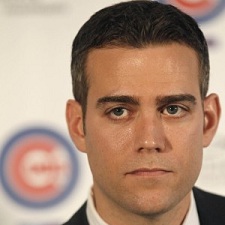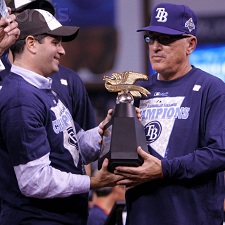BASEBALL GUYS DO SUPER JOB FOR INDY
Sunday, January 29th, 2012As unlikely as it seems, the Super Bowl comes to Indianapolis next Sunday. As unlikely, too, as it may seem, there is a baseball connection to that development.
Twenty years ago, Jeff Smulyan was the principal owner of the Seattle Mariners. One of his major partners was Michael Browning. Smulyan and Browning were Indianapolis residents and businessmen then and still are now.
By now, their baseball endeavor is ancient history, maybe best left there. But Smulyan and Browning are enjoying the fruits of their Super Bowl efforts this week, Browning as chairman of the game’s host committee, Smulyan as one of the committee’s co-chairmen.
Besides their coup in getting the game for their city, the two men have a big advantage over most of the fans who will attend the game between the New York Giants and New England Patriots. They can sleep in their own beds this week, and they have tickets for the game at no cost to them.
Tickets were available on Internet sites at the start of the week for $15,000, maybe more. That should be enough to include housing, but fans can’t sleep in their Lucas Oil Stadium seats so a few of them might want to consider the house that, according to an advertisement in the Sunday New York Times, was available for $2,250 a night, minimum five nights.
The house, the ad says, is half a block from the stadium and has three bedrooms, a bathroom, a living room and a dining room. It doesn’t say anything about a kitchen so the renter may have to bring in.
Just the fact that Browning, Smulyan and their associates could convince National Football League owners to stage the game at a cold-weather site was remarkable enough. Of the first 45 Super Bowls – or should that be XLV Super Bowls? – only 3 were played in cold-weather sites, 2 in Michigan, 1 in Minnesota.
“The first time we bid Dallas was our main challenger,” Smulyan related. “We lost by one or two votes. They have 30,000 more seats and 120 more suites. We were encouraged to bid again, and we won pretty handily. The league has changed its thinking about warm-weather cities. The idea is to recognize it is a cold-weather venue. They want to make it like a Winter Olympics.”
While this week’s “NFL Experience” will include outdoor events, the game will be strictly an indoor affair. “We have a retractable roof, but it will be closed Feb 5,” Smulyan said.
During his 2 ½-year ownership of the Mariners (1990-91 seasons and half of ’92), the team played in a domed stadium known as the Kingdome and set attendance records in both full seasons, reaching 2.14 million in 1991, the same year the franchise achieved its first winning record in its 15-year existence.
The Mariners, however, were financially unstable. “We couldn’t sustain our losses; we just couldn’t sustain the losses we suffered there,” Smulyan said by telephone from his Emmis Broadcasting office last week.
Stuck in an undesirable situation, Smulyan followed the example of an owner who had become his role model, Jerry Reinsdorf of the Chicago White Sox. He tried to move the Mariners to St. Petersburg, Fla., the desired destination of every team that wanted to change locations.
Reinsdorf had used St. Petersburg as a wedge to get a new park in Chicago, and when it worked for him, Smulyan figured he would try using St. Petersburg not to get a new park but a new city.
 Smulyan, however, had neither Reinsdorf’s political experience nor his clout. Without having permission from Commissioner Fay Vincent to proceed as he did, Smulyan met secretly with a Florida group that wanted to put a team in the empty domed stadium in St. Petersburg.
Smulyan, however, had neither Reinsdorf’s political experience nor his clout. Without having permission from Commissioner Fay Vincent to proceed as he did, Smulyan met secretly with a Florida group that wanted to put a team in the empty domed stadium in St. Petersburg.
However, someone in Florida alerted Vincent’s office to the meeting, and Vincent called Smulyan and told him, in effect, that unless he was there to lie in the sun on the beach he better get his rear end out of there. Vincent also fined him $250,000, a former baseball official recalled.
Vincent and owners didn’t want to approve a team’s relocation to St. Petersburg because they had been discussing the possibility of expansion and were saving the city as a possible expansion site. The San Francisco Giants were blocked earlier from moving to Tampa for the same reason.
Smulyan was left with no recourse but to sell the team. Even that effort became a difficult process. No Seattle buyer came forward. A Portland, Ore., lawyer proposed that the Mariners become a northwest region team, say, the Cascadia Mariners, playing 51 home games in Seattle and 15 each in Portland and Vancouver
Finally, a United States Senator, Slade Gorton of Washington, recruited the owners of Nintendo, the video game manufacturer, which had 1,400 employees in the Seattle area. They were prepared to buy the team, but other owners weren’t thrilled with the idea of having a foreign owner.
Eventually, a compromise was worked out by which American interests would own the majority, though Nintendo was the single biggest owner. The deal was completed July 1, 1992, and nearly 20 years later Nintendo has been an exemplary owner and Smulyan and Browning, a real estate developer, are going to the Super Bowl.
“I have always loved the game; I always will,” Smulyan said. “I learned a lot there.” He added, “I got in trouble saying we could solve this problem in three days in Indianapolis.”
Since selling the Mariners, Smulyan has attempted one foray back into baseball, joining a group that tried unsuccessfully to buy the Washington Nationals.
If he did nothing else in his baseball career, by buying the Mariners, Smulyan rid baseball of one of its most inept owners, George Argyros.
Smulyan’s hometown of Indianapolis has had minor league teams for years and years but never a major league team.
“It’s probably too small,” he said. “We’re not a large tv market. We’ve been fortunate to have the Pacers and the Colts. People have talked about getting a baseball team. Nothing would make me happier than having a baseball team.” He paused for a second, then added, “Nothing would make me happier than having a baseball team and me not being the owner.”
GREAT GUY GETS GREAT HONOR
For a guy who batted .181 (in 49 games), Tom Kelly had a pretty good major league career. He won two World Series. One of the best people I have covered, Kelly will have his uniform number 10 retired by the Minnesota Twins late in the coming season.
The Twins made the announcement at their awards dinner last week after Kelly had given out the last – he thought – award.
“I got ambushed,” Kelly said on the phone. He explained that he gave John Gordon, who is retiring, an award for his 25 years as a Minnesota Twins radio announcer and was preparing to leave the stage when someone said, “You gotta stay here.”
Kelly said he looked to see what was happening and saw Jim Pohlad, the Twins’ chief executive officer, approaching.
“I saw that he had something in his hand,” Kelly related, “and I said ‘oh oh.’ They got me.” It was now Kelly’s turn to speak and he said, “I didn’t make it through.”
Kelly managed the Twins for 15 seasons plus part of a 16th season, beginning at age 36 in 1986, and led them to World Series triumphs in 1987 and ’91. He last managed in 2001. Does he regret retiring so young?
“You miss the camaraderie and the competition,” he said. “But I don’t miss the travel and the trainers and the doctors.”
He referred to his treatments for his bad knee, not the people.
“I see the games,” he said. “I sit on the edge of the seat, the mind starts going.”
Kelly continues to work for the Twins, helping his successor, Ron Gardenhire, where he can.
“We’ll have 65 people in spring training, 39 pitchers,” he said. “That’s a lot for us. I’ve been getting my body in shape. I’ve gone to physical therapy for me knee. They glued me back together. I hit 73 fungo swings today.
I hit fungoes into a net. They have me stepping a little different with my foot. It helps my knee.”
Kelly will be the sixth member of the Twins to have his number retired but the first manager. The others: Harmon Killebrew, Rod Carew, Tony Oliva, Kent Hrbek, Kirby Puckett and Bert Blyleven.
RED SOX STILL SUFFER; NOW IT’S PTSD
If Kevin Youkilis is typical, the Boston Red Sox may be suffering post-traumatic stress disorder.
 Speaking to reporters at his annual charity event last week, the infielder said he had talked with the team’s new manager, Bobby Valentine, during the off-season, and this is what Youkilis came away thinking:
Speaking to reporters at his annual charity event last week, the infielder said he had talked with the team’s new manager, Bobby Valentine, during the off-season, and this is what Youkilis came away thinking:
“I think he’s going to bring a winning attitude and he’ll get this team going from day one. The thing I got from Bobby now is you play the game hard, you play the game right and if you do the little things right, he’s going to love you.”
Am I missing something? Or is Youkilis missing something?
Valentine is replacing Terry Francona, who was the major league manager of the decade for the first decade of this century. Admittedly, my memory isn’t what it used to be, but I checked the records and confirmed that the Red Sox won two World Series in a four-year span with Francona as their manager. The last time a Red Sox manager did that was in the second decade of the last century.
A winning attitude? I suspect Francona brought a winning attitude to the Red Sox. Did Francona love his players when they played the game right and did the little things right? I would bet that even Youkilis, when he is thinking clearly, would acknowledge that he did.
Youkilis also said of Valentine, “I think he’s going to be great.”
Francona has already been great. Let Valentine match or exceed Francona’s achievement, and then talk about him being great.
If in his comments, Youkilis was thinking about the Red Sox great September collapse, he might have first considered what he did at the plate in September (.167 batting, .222 slugging) and what he did in the clubhouse to police the in-game consumption of fried chicken and beer, especially the last three weeks of the month when he played only three games.

 That Heyman is first with a major Boras signing has come to be expected in the baseball and reporting industries. There’s nothing wrong with a reporter having a good relationship with an agent, but the Heyman-Boras link has been so beneficial to Boras that years ago baseball executives told me they understood that Heyman was on Boras’ payroll.
That Heyman is first with a major Boras signing has come to be expected in the baseball and reporting industries. There’s nothing wrong with a reporter having a good relationship with an agent, but the Heyman-Boras link has been so beneficial to Boras that years ago baseball executives told me they understood that Heyman was on Boras’ payroll.
 Add to his questionable steps the fact that Selig allowed the Cubs and the Red Sox to violate his rule on minority interviewing in their hiring of new executives. The Cubs hired Epstein as president of baseball operations and Jed Hoyer (at left) as general manager; the Red Sox promoted Ben Cherington, Epstein’s assistant, to general manager.
Add to his questionable steps the fact that Selig allowed the Cubs and the Red Sox to violate his rule on minority interviewing in their hiring of new executives. The Cubs hired Epstein as president of baseball operations and Jed Hoyer (at left) as general manager; the Red Sox promoted Ben Cherington, Epstein’s assistant, to general manager.
 Given the remarkable success of the Tampa Bay Rays, the suggestion might be unfair for them. The Florida Marlins, on the other hand, would not likely be missed.
Given the remarkable success of the Tampa Bay Rays, the suggestion might be unfair for them. The Florida Marlins, on the other hand, would not likely be missed.
 Gary Carter’s condition was found last week to have worsened. Doctors found more tumors on his brain, where a malignant glioblastoma tumor was discovered last May. I would like to comment on Carter’s circumstances, but I have unfortunately learned too much about brain tumors to write about the Hall of Fame catcher now.
Gary Carter’s condition was found last week to have worsened. Doctors found more tumors on his brain, where a malignant glioblastoma tumor was discovered last May. I would like to comment on Carter’s circumstances, but I have unfortunately learned too much about brain tumors to write about the Hall of Fame catcher now.